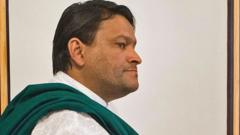The murder of Muhsin Hendricks, a trailblazing gay imam in South Africa, has elicited sorrow and anger from the LGBTQ+ community, while also catalyzing a renewed commitment to combat discrimination within religious contexts.
Tragic Loss of Pioneering Gay Imam Sparks Fear and Resolve Among LGBTQ+ Community

Tragic Loss of Pioneering Gay Imam Sparks Fear and Resolve Among LGBTQ+ Community
The assassination of Muhsin Hendricks, South Africa's first openly gay imam, has raised alarms and underscored the struggle for acceptance within religious circles.
Even in the last moments of his life, the first openly gay imam, Muhsin Hendricks, was pushing progressive boundaries, a sentiment echoed by many in South Africa’s LGBTQ+ community following his tragic death. The imam, 57, was shot execution-style in Gqeberha during what his Al-Gurbaah Foundation clarified was a visit to officiate the marriages of two interfaith heterosexual couples, not the same-sex weddings as initially reported. His assassination has not only left a sense of fear among LGBTQ+ individuals but has ignited a stronger resolve to end their marginalization within faith-based environments.
Reverend Toni Kruger-Ayebazibwe, an openly gay Christian leader, described Hendricks as a "gentle spirit," noting that his presence brought light into the lives of many. With her comment, she highlighted the overwhelming grief felt among queer Muslims globally, stating, “The gap Muhsin leaves is massive.” This sentiment is shared by many, particularly since Hendricks was a crucial figure in advocating for greater acceptance and understanding of LGBTQ+ identities within Islamic circles.
South Africa is recognized for having a liberal stance on LGBTQ+ rights, being the first African country to legalize same-sex marriage in 2006 and incorporating protections against sexual orientation discrimination into its constitution in 1996. However, Hendricks's work to bridge the chasm between faith and sexuality often put him at odds with traditional Islamic authorities, who condemned his actions and referred to him dismissively, highlighting the polarizing views within the community.
Despite facing ostracism from established religious institutions, Hendricks founded The Inner Circle, a support group designed for queer Muslims seeking to reconcile their faith with their sexual identity. His unprecedented steps have not only challenged existing norms but have also provided a sanctuary for those in similar situations.
In the wake of his death, major Islamic organizations like the Muslim Judicial Council (MJC) and the United Ulama Council of South Africa (UUCSA) condemned the killing, while also promoting peaceful coexistence within diverse beliefs. Yet, traditional values among many religious leaders persist in rejecting same-sex relationships outright, demonstrating the complexity of navigating faith and sexuality in contemporary society.
Leadership within LGBTQ+ advocacy groups recognizes that this violent act is likely to exacerbate the challenges faced by community members, potentially silencing voices of dissent. Dr. Fatima Essop, a senior lecturer in Islamic studies, expressed her dismay over the subsequent vitriolic reactions online, stating, “There is absolutely no justification, Islamic or otherwise, for this kind of violence.” This observation encapsulates the broader struggle that LGBTQ+ individuals still face in South Africa, where even in communities that appear to be advancing, pockets of conservatism remain entrenched.
As Hendricks's funeral was privately held, plans for a public memorial are in the works to honor his contributions to both the LGBTQ+ community and the broader dialogue on faith and acceptance, illustrating a steadfast commitment to continuing his legacy. For activists like Teboho Klaas from The Other Foundation, the message is clear: even though Hendricks's life was cut short, his influence will resonate within the LGBTQ+ movement for years to come.
Reverend Toni Kruger-Ayebazibwe, an openly gay Christian leader, described Hendricks as a "gentle spirit," noting that his presence brought light into the lives of many. With her comment, she highlighted the overwhelming grief felt among queer Muslims globally, stating, “The gap Muhsin leaves is massive.” This sentiment is shared by many, particularly since Hendricks was a crucial figure in advocating for greater acceptance and understanding of LGBTQ+ identities within Islamic circles.
South Africa is recognized for having a liberal stance on LGBTQ+ rights, being the first African country to legalize same-sex marriage in 2006 and incorporating protections against sexual orientation discrimination into its constitution in 1996. However, Hendricks's work to bridge the chasm between faith and sexuality often put him at odds with traditional Islamic authorities, who condemned his actions and referred to him dismissively, highlighting the polarizing views within the community.
Despite facing ostracism from established religious institutions, Hendricks founded The Inner Circle, a support group designed for queer Muslims seeking to reconcile their faith with their sexual identity. His unprecedented steps have not only challenged existing norms but have also provided a sanctuary for those in similar situations.
In the wake of his death, major Islamic organizations like the Muslim Judicial Council (MJC) and the United Ulama Council of South Africa (UUCSA) condemned the killing, while also promoting peaceful coexistence within diverse beliefs. Yet, traditional values among many religious leaders persist in rejecting same-sex relationships outright, demonstrating the complexity of navigating faith and sexuality in contemporary society.
Leadership within LGBTQ+ advocacy groups recognizes that this violent act is likely to exacerbate the challenges faced by community members, potentially silencing voices of dissent. Dr. Fatima Essop, a senior lecturer in Islamic studies, expressed her dismay over the subsequent vitriolic reactions online, stating, “There is absolutely no justification, Islamic or otherwise, for this kind of violence.” This observation encapsulates the broader struggle that LGBTQ+ individuals still face in South Africa, where even in communities that appear to be advancing, pockets of conservatism remain entrenched.
As Hendricks's funeral was privately held, plans for a public memorial are in the works to honor his contributions to both the LGBTQ+ community and the broader dialogue on faith and acceptance, illustrating a steadfast commitment to continuing his legacy. For activists like Teboho Klaas from The Other Foundation, the message is clear: even though Hendricks's life was cut short, his influence will resonate within the LGBTQ+ movement for years to come.






















